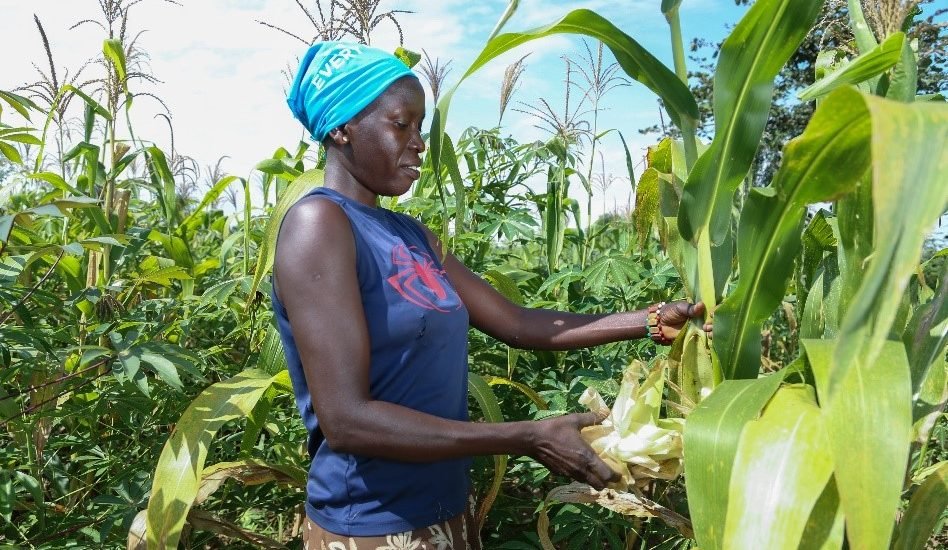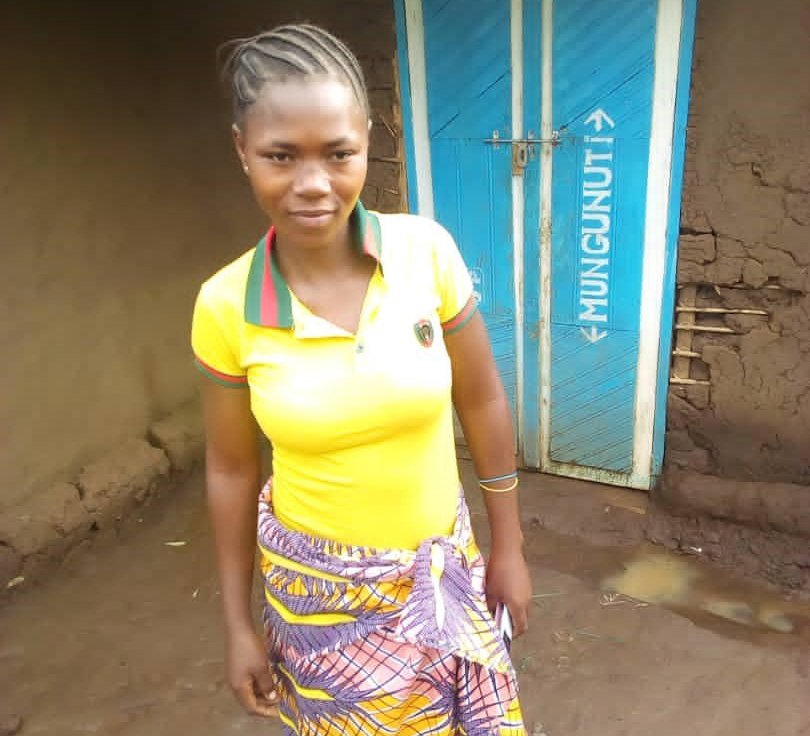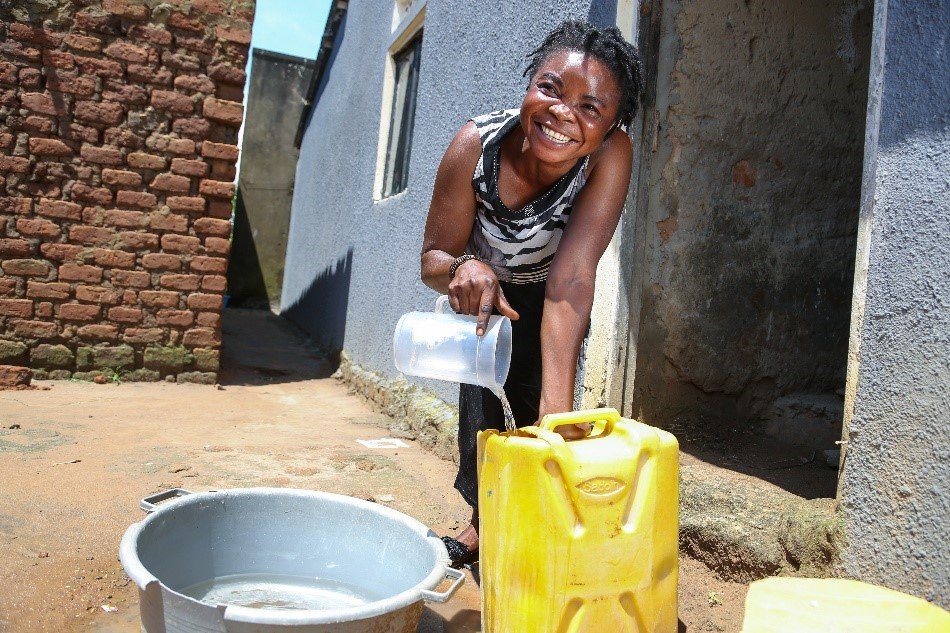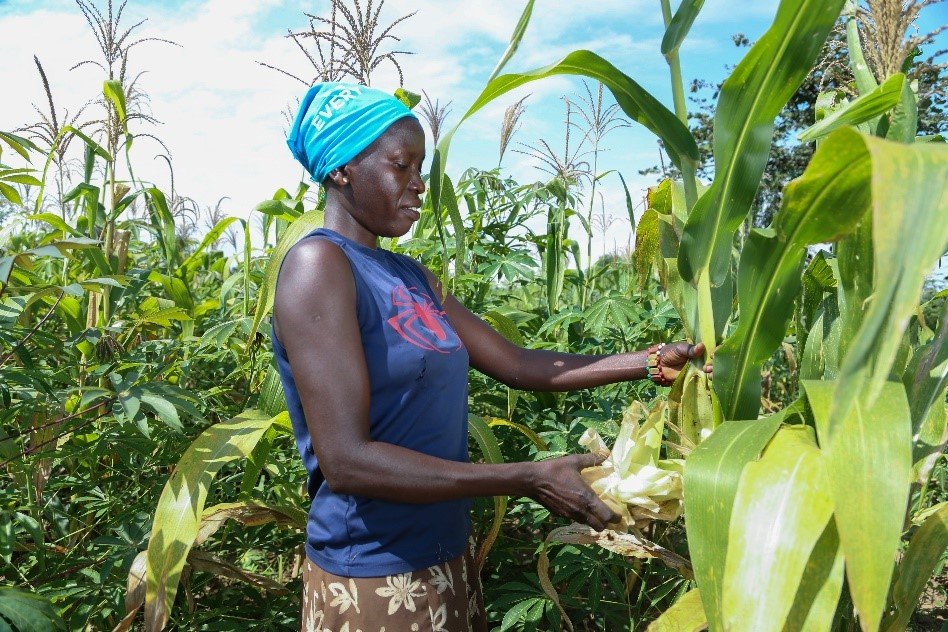Orange the World: Fund, Respond, Prevent, Collect!
- November 27, 2020
- Posted by: WebAdmin
- Category: News


16 DAYS OF ACTIVISM AGAINST GENDER BASED VIOLENCE
This year, the 16 days of Activism against Gender Based Violence held the theme “Orange the World: Fund, Respond, Prevent, Collect!”. The following is a list of real-life stories involving women in the struggle against Gender Based Violence.
"I feel safe, happy, and appreciated. I am a new Mave"

"My name is Neema Mave, I am 20 years old and a single mother of a two and a half years old girl. Currently, I live with my aunt and her three children in block 7 Waibuga Maratatu D, in Kyangwali settlement. In Jan 2018, while I was in our garden in the Democratic Republic of Congo (DRC), three men came out of nowhere and raped me. I went back home and kept quiet because of fear. I did not know what to tell my parents or how they would react.
A week later, war broke out and we were forced to flee and seek refuge in Uganda. We were resettled and lived in block 68 Maratatu A. When I realized I was pregnant, I decided to tell my parents who did not believe and were very angry with me. Life was very difficult for me, I had no peace at home. My parents were always quarrelling and uttering bitter words at me. They decided to go back to DRC and gave me two options to either return with them or stay. A day before they departed, I decided to look for my aunt who was staying nearby and asked if I could stay with her. I narrated what had happened to me and how my parents were treating me and she accepted to stay with me. She counselled and encouraged me not to lose hope”.
Mave’s aunt advised her not to blame herself since what had happened was not her fault. Luckily for Mave, in March 2018, she came in contact with one of CARE’s community-based facilitators during a community dialogue. She was provided with psychosocial support and this was her turning point.
“I met one of CARE’s community-based facilitators who realized I was in distress, she encouraged me to visit the women and girls center at my convenient time. I had so many questions; how am I going to manage the pregnancy, what will I tell the child about her father/origin, how will I support the child? When I went to the centre where I was welcomed, talked to, and encouraged which helped restore the hope I had lost and changed my mindset. All the questions in my mind were dissolved after receiving support from CARE. I was given non-food items like a bucket, a pair of bedsheets, Kitenge, laundry soap, vaseline to help support during pregnancy. After delivery, I was helped to get my own attestation card from the Office of the Prime Minister and encouraged to join the survivors’ peer support group where experiences and stories are shared by group members to enable us to develop a positive coping mechanism and help in restoring hope.
These stories gave me hope and helped me to get used. I joined CARE’s Girl Shine Program where I gained knowledge and life skills of managing daily life situations and challenges. I feel so happy and empowered today knowing I have peers who can support me. CARE staff has continued to occasionally make home support visits to assess my progress.
I am grateful to CARE because amidst COVID-19 and during lockdown they did not forget about me and other girls. They supported us with dignity and hygiene kits to improve our hygiene, be self-reliant, and protected us from being exploited. Today as I speak, I am an empowered girl, I do not depend on only food ratio but also do a small business of selling bananas near our home where I get some income to support myself, daughter, and complement my aunt. I can do my business as well as monitor home to give my aunt ample time to go and participate in economic and other community activities.
I was also identified and trained as a girl shine mentor to support other young girls in my community by disseminating information to increase their knowledge and change their behaviors. This has empowered me, improved my self-esteem, I feel more valued and satisfied as a result of the support I give to my peers. I believe it’s important to share knowledge and skills acquired during sessions with girls in the community whose parents have denied them the opportunity to come to the center. I am thankful to my aunt who has supported me all through the difficult moment, provided me guidance, love, financial support to start my business, affection and involved me in decision making. Today I feel safe, happy, and appreciated. I am a new Mave”.
Mave also called upon parents and care givers to support their girls when experiencing such traumatizing events because it was not their mistake to be raped, and to all girls not to give up but rather join supportive peer groups for faster healing and developing better positive copying mechanism.
"Bv survivor abandons cultural perceptions and speaks out against domestic violence.

River Oli- B, Arua Municipality Uganda.
In some parts of Northern Uganda, reporting a case to the police implicating your husband is not socially acceptable thus one of the reasons why many women are undergoing gender-based violence in silence. This was the case with forty-year-old Beatrice Asara. She was born in Arua and is currently residing in the River Oli-B cell located in Arua municipality.
The mother of three was experiencing both physical and emotional abuse for over four years, however, was shy to report until recently when she came in contact with Community Empowerment For Rural Development (CEFORD). CEFORD, one of CARE’s partners implementing the Women and Youth Resilience Project (WAYREP) with funding from the Austrian Development Agency, developed door to door outreaches as one of the COVID19 response and adaptation mechanisms to identify women and girls experiencing GBV. According to Beatrice, extramarital affairs sparked off all their marriage problems.
“When I got married, we were living happily. However, after some years, I got to learn that my husband was having sexual affairs with other women. He started sleeping outside the home and could only return occasionally. I informed his relatives and they tried to talk to him however he did not listen. Six years ago, he decided to abandon me in this very house with our three children. Unfortunately, at that time, I had just given birth and had a three months old baby. At the same time, I developed a sudden illness that left one of my eyes partially blind. Therefore, my husband was the one providing for everything including buying food, buying scholastic materials for the children, and paying for this house.
Beatrice says the husband has been gradually reducing the support despite knowing that they are totally depending on him and this got worse during the outbreak of the COVID19 pandemic.
“When corona came, things were bad. He stopped buying food and would just give us a total of UGX 5,000 and that was it. He doesn’t talk to me or want anything to do with me. I even thought of leaving the children behind but realized they would suffer. At first, I feared to report him because I thought at one time I may be forced to pay a cow as a punishment in case he was arrested after reporting him”.
“During the lockdown, I was moving door to door visiting people’s homes. I came and found Beatrice seated at the door. I Introduced myself and what we do and luckily she opened up on the first day. She told me her story and I advised her to approach the husband’s relatives to help but said they have tried many times in vain. I then informed her of another option; the child protection unit at police. However, she took her time because culturally it doesn’t look good to take your husband to the police. I decided to refer her to the caseworker who then reached out to her.” Said Comida Harriet, CEFORD Community Based Trainer. They continued to engage her but gave her time to make her own decision. In July 2020, she couldn’t take it in anymore. Together with her eldest daughter of six years, they reported the husband to the child protection unit where he was summoned within a day and he agreed to support them.
According to Beatrice, the Police asked how he planned to commit to this support. “He promised to pay rent which he now pays directly to the landlord; said he would be stocking food and gave us money which my daughter Feni (Betty’s second eye is currently affected thus can hardly support herself but greatly relies on her sixteen-year-old daughter Feni) used to buy and stock food items however these got finished and he has not yet stocked again. He also committed to giving us UGX 10,000 which either of my children picks daily from his garage”; said Beatrice.
She is thankful to CEFORD for supporting her look at the brighter side of life. “I don’t regret anything because I used to hear these things. My paternal uncle once told me to report but I was reluctant. He said; if you report nothing will happen to you since you have not wronged anyone but I still kept quiet until CEFORD came in and made me understand how reluctant I have been for all these years. My desire is to see all my children educated”.
Beatrice is now thinking of how she can get money and start any business despite her sight issues to reduce her dependence burden. Meanwhile, CEFORD has so far registered 17 cases of women experiencing GBV in the same area where Beatrice stays.
I was voiceless but I am now a leader and a business woman

Ndaapi, Omugo Sub-county, Arua District, Uganda.
"At first, women were let down; In case of a cultural gathering, men did not want to hear any voice of a woman including the church. Women were not supposed to lead or do business and even eat chicken. Girls were taken as property and their work was in the kitchen. Women were not entitled to their own land. In the past, most of the women were casual laborers however these days I don't see them doing that, they are instead selling groundnuts, beans, and other food items. I am seeing changes" . . . says thirty-two-year-old Emily Nyakaru, who has won the admiration of both men and women from her community in Ndaapi parish- Omugo sub-county in Terego District.
“I was voiceless; I used to sell local brew but when I joined one of the savings groups in 2009, I was advised to change and do another business by some of the members within our group. In 2011, I opened a kiosk in my compound and started selling sesame and fish and have since never looked back. I am now growing maize, cassava, and groundnuts for both eating at home and selling. Today I am a farmer, a businessperson, I have built my own house and I am also a leader; I am the secretary of our savings group where I record all our weekly meetings”.
Emily’s saving group is among the groups in Omugo Sub-county selected by Community Empowerment For Rural Development (CEFORD). The group was selected because it was an existing Village Savings and Loan Association (VSLA). CEFORD partners with CARE under the Women and Youth Resilience project in areas of economic empowerment, gender-based violence, and psychosocial support and advocacy.
“We give them technical support, financial literacy skills and we plan to provide them with proper saving kits. The VSLA is one of the entry structures to deal with GBV hence our support in case management”. Explains William Mazu, CEFORD Project Officer-GBV Prevention. Emily reports that the coming of CEFORD was to empower them through knowledge sharing. “I have seen CARE and CEFORD empower girls, women, and youth who are the most vulnerable group in Uganda. I was personally tortured when my husband left me with these three children. I sought the help of the community-based trainer and my husband now calls me and I feel changed” explains Emily. According to Emily, GBV was the biggest problem affecting women in Omugo parish however reports that it has since reduced with the intervention of CEFORD.
“Money was the problem; during the planting season, you plant together with your husband but time for harvest, the husband runs off with the money to sort his own needs. We requested the (CBTs) to organize community dialogues. Our men accepted they were wrong and started changing”. Emily’s day starts with garden work, where she goes with her children including other children under her charge. After this, she goes to the market to buy supplies for her business before she returns home to start on her household chores with the support of her children. In a week, Emily makes between UGX 20,000 and UGX 40,000 from her business which helps her meet her basic household needs and the weekly savings. Asked about her future plan, Emily had this to stay; “I previously saved to build a house after the one my husband left us in started leaking from the roof. This December, I expect about one million Uganda shillings from this year’s saving cycle which I will use to start a retail shop in this area selling both food and non-food item things.
Remote counselling a turning point for an eight-year gruesome marriage experience

Pece Vanguard, Division B, Gulu Municipality, Uganda.
In March 2020, H.E the President of the Republic of Uganda issued a directive to lock down the country as a precautionary measure against the unprecedented outbreak of the COVID19 pandemic. This move paralyzed many businesses and activities across the country and accelerated the increase of gender-based violence. CARE with support from the Austrian Development Agency, conducted a Rapid Gender Analysis (RGA) to understand the exposure and vulnerability of women and girls to COVID-19. This guided the support for COVID19 response and adaptation on delivering essential services.
COVID19 response and adaptation on delivering essential services. One of the informed adaptations was the provision of remote psychosocial First Aid which helped to identify women and girls experiencing GBV. Thirty-nine-year-old Grace was among the beneficiaries of the remotes services offered by Partners for Community Health and Development Organisation (PACHEDO) under the Women and Youth Resilience Project (WAYREP) ending an eight-year grisly experience of GBV.
“I stopped in primary five because of school fees however I am proud I went to school. I can write my name and read signposts. My husband married me after dropping out of school and we started living together. After our first child who is now 20 years, life was hard financially and our home area in Kitgum became insecure with rebels. We decided to move here to Gulu to look for jobs and a better life. I started hawking boiled maize while my husband was riding a boda boda (bicycle). Fortunately for him, he advanced to a motorcycle boda boda and was doing well. I also changed to selling cassava however most women started doing the same business in the area and it was no longer profitable after one year. I decided to start selling millet porridge something I have done for the last five years. My husband was lucky, he got money from Boda boda and decided to go for a course in masonry and that is what he does for a living”.
According to Grace, the more progress and money the husband made, the more he belittled her and even sought for extramarital relationships with the justification that she was not good enough for him. “He started drinking a lot of alcohol and stopped providing for us around 2014. Each time he went to drink, he would come back very drunk, and any small argument would end in beating me up using his tools for building. I would be beaten in front of the children, and each time the neighbours came to my rescue, he would tell them off; that no one can change anything about him. He would ask me to account for all the money from my porridge business and sometimes insist that I hand him all the profits made”.
While she made several attempts to ran away, she never reported to the police for fear that the father of her children would be arrested, something that is not ‘culturally’ accepted according to her. She opted to involve her family members and the husband’s relatives to intervene. Unfortunately, this was in vain.
‘One time, I was trapped in the house, and he strangled me several times. I knew I was going to die that night but luckily survived. In the morning, I went back to my parents’ home, and my father called him to our home. He promised to change; however, when we came back, he continued beating me and said, your parents are kilometers away, what will they do? Nothing . . . ‘. When her option of seeking family support to resolve the issue failed, Grace accepted this as her normal life. While all the neighbours were tired of these scenes, their hands were tied. She could be beaten two to three times a week.
The couple has six children; four girls and one boy; aged 20, 17, 14, 12, and seven. They live in Pece Vanguard, Division B, Gulu Municipality where they are renting two traditional grass-thatched houses to accommodate their family, a home where she has witnessed the worst form of gender-based violence. Luckily for Grace, while the world was condemning the unprecedented outbreak of COVID19 and subsequent lockdown, this was her turning point. At the beginning of the lockdown, one of Grace’s friends who had witnessed her ordeal several times got an opportunity to work as a community-based facilitator through PACHEDO. According to Grace, her friend realized she could actually help Grace through the referral mechanism. She linked Grace to one of PACHEDO’s program officers for Case Management.
“During the lockdown, I was reaching out to her remotely, when the lockdown was lifted, I came and met her face to face. She had experienced a series of violence, and so we were meeting weekly. The first time I came here, this was not her weight. Her mood was off each time I talked about her husband”. Said Patience Ataro, PACHEDO Project officer who handled her case.
“The husband was so much into alcohol and peer groups which made him so abusive. At first, he did not want to be involved, but the wife and children wanted to see the change. He was not happy to come, but I used a role play..living in a woman’s world. I made him act like a woman and the wife to act like a man. That was the turning point.so is this what the women go through?” He posed a question to Patience after the role play. According to Grace, the lockdown was a perfect timing and turning point in her marriage, and is grateful to PACHEDO.
“Each time I talked to her, I got relief. She also gave me hope and asked if I could allow her to involve my husband. He was home and not working because of the lockdown; I was the one sustaining the family with my porridge business. When Patience involved him, I saw some change in the first week; he would keep quiet after his drinking and also started leaving something small at home before he went off to drink. The fights and quarrels stopped. When the lockdown was lifted, he told me; my wife, take a break for some time while I also work and take care of our family. You did a lot for us during the lockdown. So I took a break from the business and resumed recently after two months. I am happy and doing well. He is happy that his ‘flesh is good and the stomach is pushing the shirt’ (her illustration of weight gain) because he takes only what is enough, and I am positive he will completely stop. His peers are now saying I pocketed him because he has changed a lot from his previous behaviors”.
Grace continues with the porridge business that earns her a profit of UGX 6,500 daily. She is now able to save because the husband takes care of all their needs and even gives her the capital in her business occasionally. She plans to grow her business and join efforts with the husband to buy land where they can build their own house. Grace concluded by advising organizations implementing in their communities. “Many women are experiencing violence, there is a need to target men on awareness for the prevention of violence because they are responsible”.
Physical Address:
5th Floor, Union House, Plot 78, Luthuli Avenue, Kampala.
Tel: +256 31 2258100
Thank you to all who supported us on this journey, including the untiring colleagues at CARE International in Uganda.



